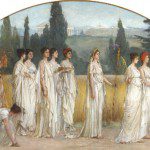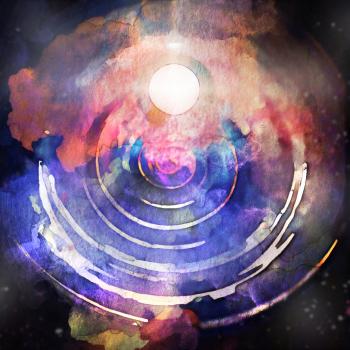The idea of honoring Heroic Ancestors came to me a few years ago when my grove was working on a Lughnassadh ritual and we wanted to connect with our inner warriors. I thought about the warriors in pagan history, and frankly Perseus, Hercules, and Sigurd really didn’t resonate. But I’ve always had a great deal of reverence for a number of modern heroes, including Harriet Tubman, Eleanor Roosevelt, and Martin Luther King Jr. The rite was a wonderful success, empowering each of us to strive to be more like those people who had come before.
A few months ago, for Pride Month, I decided to research the heroic ancestors of the LGBTQAI+ community. My grove did a Rainbow Midsummer Ritual that included calling on them as the ancestors of our rite. Since then I have been working with them as a class of spirits, especially when asked to do healing or protection work for those who identify part of the QUILTBAG. My results have been spectacular. I would encourage anyone who is part of the QUILTBAG or an ally to build relationships with these supportive and powerful ancestors.
Now I am researching the Heroic Ancestral Women of Technology and Science for a commissioned art shrine that I am doing for one of my Patreons. I will be working with these women over the next few months, building relationships with them and giving them offerings. I look forward to seeing how those relationship develop, having seen how powerfully and positively the LGBT ancestors have responded. In this post I have listed them in chronological order by their birth. All of them are fascinating women who strived to reach their goals. There are so many that I haven’t listed, feel free to share your favorite Ancestors of Science in the comments below!
Heroic Ancestral Women of Technology and Science:
Hypatia (born c. 350–370; died 415 AD) As the first historically recorded female mathematician she holds a place in my heart. She taught astronomy and philosophy in Alexandria a few centuries after the original Library of Alexandria was burned. In her day, saying she taught philosophy was the same as saying she was a hard core scientist. There was no distinction between the two at that point in Western history. She built astrolabes, counseled the governor of Alexandria, wrote commentary on a number of mathematical treatises at the time, and taught both Pagan and Christian pupils equally; even though she was a Pagan herself. She was murdered for politics and religion by a group of Christian monks. In the modern era Hypatia was chosen as the honored ancestor of Cherry Hill Seminary, a modern pagan seminary.
Are you a student or a teacher? Does scholarship and learning appeal to your soul? Then I would suggest honoring Hypatia at your altar or shrine as one of your heroic ancestors.
Ada Lovelace aka Augusta Ada King, Countess of Lovelace (December 10 1815 – November 27 1852) You can thank Wikipedia for that gem, Dear Reader. Countess of Lovelace indeed. Even though her name seems ridiculous, you have to remember that in Victorian England the only people who had enough money and leisure time to study theoretical sciences were the nobility. Bourgeoisie politics aside, Ada Lovelace was arguably the very first computer programmer. Ever. She beat the boys to the trigger totally. Go Ada! She worked with Charles Babbage on his very early computer, which was delightfully named The Analytical Engine. She saw the potential it had for calculations and designed the first proto-program algorithm. Best of all, she believed in “poetical science” and was in fact the daughter of the poet Lord Byron.
She walks in beauty, like the night
Of cloudless climes and starry skies;
And all that’s best of dark and bright
Meet in her aspect and her eyes.
If you’re a person who loves both science and the magic of words, who sees the world a little strangely, Ada Lovelace is the ancestral hero for you.
Bertha Benz (May 3 1849 – May 5 1944) Not only was Bertha the Missus of Mr. Benz, she was his business partner, test driver, and genius marketer. Their business partnership came two years before their marriage when she financed his horseless carriage project. By modern law interpretation, she would have been the one to hold the patent. She had a knack for bold marketing and a do it yourself attitude that resulted in the first long distance joy ride. Using wagon tracks she traveled 66 miles through Europe with only her two teenage sons for companionship. She didn’t ask permission for her illegal journey and used her hatpin and her garter at different times to fix the horseless carriage like a mad proto-MacGyver. She telegraphed her husband when she was ready to come home, turned around and drove the whole way back.
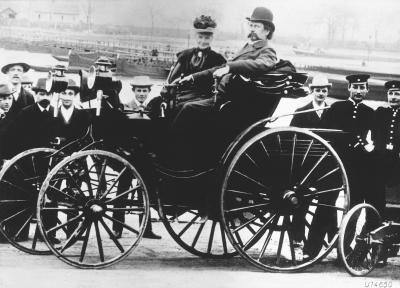
If you are an entrepreneur or maker Mrs. Bertha Benz is the ancestral hero for you. Offer her some clever marketing or a paperclip ballista and I bet she’d be thrilled.
Cecilia Payne-Gaposchkin (May 10, 1900 – December 7, 1979) Reshaped astrophysics after breaking the glass ceiling with a pop in 1925. By becoming the first woman to earn a PhD in astronomy from Radcliffe College, which is now a part of Harvard University, she paved the way for many others. Her work literally tells us what the universe is made of and is the basis for everything we know about variable stars. Not only was she foundational to our current understanding of space, she was the first woman to be appointed to the position of Department Chair at Harvard University.
If you desire to plumb the vast distances of space, or dream of stars and nebulas, she might be your lady. She was a patron of young people for much of her career, mentoring many to become ground breaking scientists in their own right. So consider praying to the Patron Saint of Science, Dr. Cecilia.
Grace Hopper (December 9, 1906 – January 1, 1992) Known as “Amazing Grace” and “Grandma COBOL” she took Ada Lovelace’s advice about poetical science and created the first programming language that used english words to create commands rather than pure math. That means every programming language you’ve ever used and all the apps, programs, and smart phones all use her ideas. It took her three years to convince people. Also, she did it while in the military, which they almost didn’t let her join. She was a Mathematics Professor at Vassar, was underweight, and too old according to the military. Only by the skin of her professorial teeth did she manage to join the Naval Reserves in 1944, too late to serve in WWII. She persevered, took a leave of absence from teaching and worked on both the Harvard Mark I and the UNIVAC computers. Both were crucial to computing history. She created the first compiler or “program linker” which translated english commands into the binary code that computers actually work in. She earned 40 honorary degrees, a posthumous Presidential Medal of Freedom, and was a Rear Admiral in the US Navy.
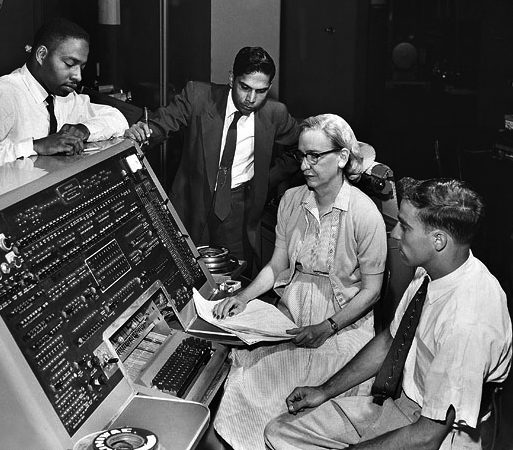
Amazing Grace shaped her own life and the lives of countless others through her dedication to service, brilliance, and perseverance. If you’re a programmer or in the military you should be honoring and remembering her contributions to our modern world.
Sarla Thakral (1914 – 15 March 2008) In 1936 was the first women pilot in India to earn her aviation license. This was eight years after Amelia Earhart crossed the Atlantic in the west. When WWII broke out she was unable to continue her career in aviation and became a well known fabric and jewelry designer.
Do you dream of doing wild and unheard of things? Have you set your heart on the unknown? Sarla Thakral might be the heroic ancestor you want to pray to, maybe as a paired set with Amelia.
Sally Ride (May 26, 1951 – July 23, 2012) The same year that Total Eclipse of the Heart came out Sally Ride was the third woman in space. However, she was the first American woman to make it out of our atmosphere and into orbit. I’d love to honor the first woman in space as a heroic ancestor, but Valentina Vladimirovna Tereshkova is still alive and kicking. Most likely she’s kicking ass. That lady is amazing.
Back to Sally, she also has the distinction of being the youngest astronaut in space. She was 32 when she had her first mission. After she retired from NASA she became a professor of physics at the University of California, San Diego and studied nonlinear optics.
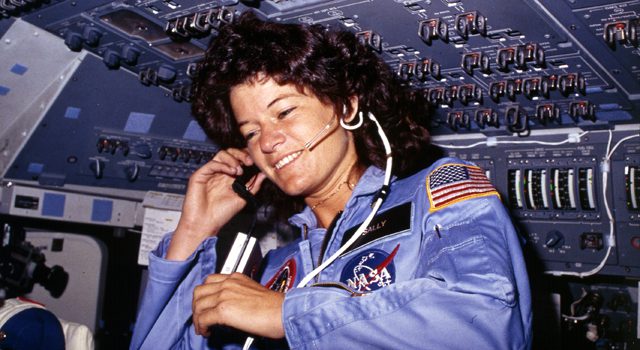
Just like 8,000 other people Sally answered an advertisement in the newspaper asking people to apply to be astronauts. She one of the few chosen. If you’re hoping to be the one chosen for a long shot, maybe you should honor this ancestor who went for a long shot more than once!
Jane Cooke Wright (November 30, 1919 – February 19, 2013) A pioneering researcher into cancer, Dr. Wright was one of the co-founders of the American Society of Clinical Oncology. She created the first drugs successfully used in chemotherapy, publishing more than 100 articles on cancer therapies. Her family was deeply involved in civil rights and racial justice as well as having a long lineage of doctors that goes back to Jane’s ancestor Dr. Ceah Ketcham Wright who was born into slavery but earned his medical degree after the Civil War. After she retired she was interviewed about her life’s work and said:
“There’s lots of fun in exploring the unknown. There’s no greater thrill than in having an experiment turn out in such a way that you make a positive contribution.”
So if you love to explore the unknown, want to help others, and make a positive contribution I would highly recommend giving an offering to Dr. Jane Cooke Wright.
That Which is Remembered Lives!
I encourage you to consider who you honor as heroic ancestors. The veil is thinning, the cold northern winds are rising bringing with them the voices of the dead. Each year we take time to build our ancestor shrines and leave our offerings for both the newly dead as well as those who we have been remember for many years. Use this time to remember those who made history or maybe more accurately, herstory. The contributions of women are not often taught in school. Take some time and find out about the amazing women who helped to shape our lives.
P.S. There’s a number of amazing women that I could’t put on the list because they’re not ancestors yet, but are well worth learning about. Katherine Goble, the famous NASA computer, Radia Perlman an early programmer known as The Mother of the Internet, and Margaret Hamilton who worked on the Apollo flight and coined the term “software engineer” all were amazing women in technology. These days we have books filled with these women, so consider checking one out of the library and learning more as a devotional practice.
If you read this article and find it helpful or useful, please consider pledging to become a patreon so that I can keep writing about Pagan needs, ideas, and theology. Thank you for every read and every share.


